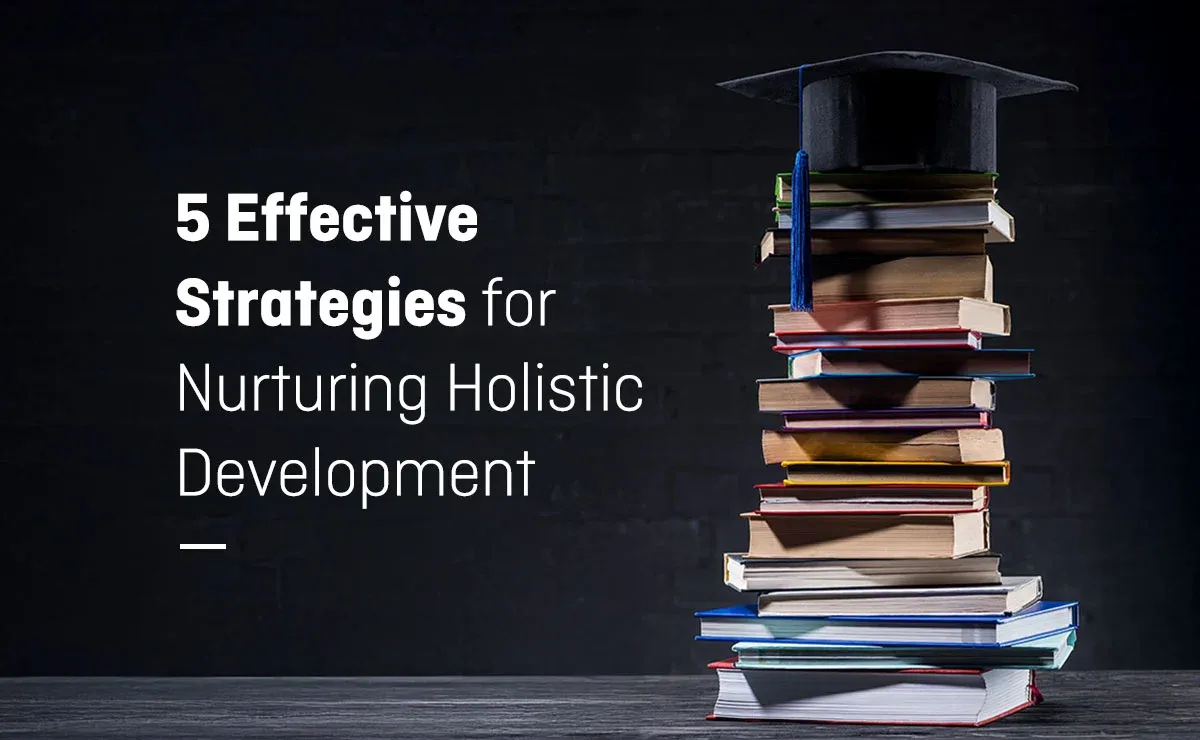What is Holistic Development?

Two recent graduates enter the workforce. One has a perfect GPA but can't work well with others. The other has decent grades but excels in communication and leadership. In today's workplace, guess who's more likely to succeed? The second one, because grades aren't everything anymore.
This points to a bigger truth: academic excellence alone won't cut it. What matters now is a person's holistic development—their intellect, emotional intelligence, social skills, physical health, and ethics. For students heading to college and into higher education, this well-rounded growth isn't just nice to have—it's essential for success in the 21st century.
Holistic development involves the development of intellectual, emotional, social, and ethical development of a student. At the Altera Institute, students participate in programs that develop skills, values, and confidence, enabling them to work in meaningful careers and secure better placements. See how our practice helps develop every aspect of life.
This article argues that holistic development is not merely a "soft skill" add-on to traditional education but a crucial necessity, especially for students at an advanced stage of education.
Understanding Holistic Development?

Holistic development in education is the comprehensive development of college students that incorporates intellectual, emotional, social, physical, and ethical aspects, so that they can emerge as wholesome individuals capable of dealing with real-world challenges and opportunities.
Key aspects of holistic development:
- Encourages critical thinking, problem-solving, and creativity.
- Inspires a spirit of inquiry and cultivates a lifelong learning habit.
- Promotes personality strength, personal growth, and personal competence.
- Helps to cope with stress and to remain mentally healthy.
- Improves interpersonal relationships through teamwork, communication abilities, and empathy.
- Trains students to operate efficiently in different teams and conditions.
- Emphasizes the importance of fitness, nutrition, and overall health.
- Enhances endurance and concentration of academic and extra-curricular engagements.
- Inculcates integrity, responsibility, and ethical judgement.
- Promotes community involvement and social service.
Holistic development not only enables a student to become a competent professional but also a responsible, caring, and flexible human being who can play a significant role in society.

The Aspects of a Holistic Development Approach
Holistic development aims to nurture individuals in all dimensions of their lives. Here are the five key aspects of a holistic development approach:

1. Intellectual Growth:
Intellectual development involves critical thinking, analytical reasoning, and a thirst for knowledge. It promotes problem-solving and innovation rather than rote learning.
Intellectual development fosters curiosity and equips students to tackle real-life issues through modern educational methods such as experiential learning, case studies, and interdisciplinary approaches. Such growth ensures that they are flexible and prepared for the constantly changing career opportunities.
2. Social Skills:
The world is becoming globalized and more interconnected via technology, hence social skills are essential to effective communication and teamwork. The holistic approach promotes students' capacity to operate in multidisciplinary teams, form and sustain relationships, and lead purposeful lives in society.
Their interpersonal skills and cultural sensitivity are developed through activities such as group projects, leadership roles, and community service. Such experiences equip students to succeed in different contexts, either in the workplace or as citizens of the world.
3. Emotional Maturity:
Emotional intelligence and self-knowledge are critical in the process of overcoming the challenges of relationships, workplaces, and life in general. The focus of holistic development is on emotional development through self-understanding, stress management, and resilience.
Mindfulness training, counseling, and peer interactions are among the techniques that help a student manage stress and maintain mental health, as well as develop empathy. To sustain a healthy lifestyle and achieve long-term personal and professional success, emotional development is critical.
4. Ethical and Moral Values:
Values and ethics give the principles under which we can lead meaningful and responsible lives. Holistic development prepares students academically and professionally, and makes them morally sound. This also involves developing a base of integrity, accountability, and good ethical decision-making.
Students develop a sense of responsibility towards society and the environment by engaging in debates on moral dilemmas, discussions on sustainability, and active participation in community projects.
5. Physical Development:
Physical health forms the bedrock of your overall well-being. In college, this is not limited to sports or fitness routines but extends to managing your energy levels and ensuring you have the stamina to meet academic and social demands.
Activities like jogging, gym workouts, or yoga can help you stay active. Also, it is crucial to sleep and eat properly, which makes physical growth more resilient to exams, deadlines, and extracurricular obligations.
Holistic development is balanced across intellectual, emotional, social, physical, and moral domains and will help students overcome difficulties with confidence and serve society as useful individuals.

What Is the Source of the Concept of Holistic Development?
The idea of holistic development can be traced to educational theories that consider people as multidimensional beings, with physical, emotional, intellectual, social, and spiritual aspects.
This method arose in response to strictly academic or vocational education, where intellectual growth is often given priority over other important elements of human development. The concept of cultivating the entire individual is a manifestation of the belief that whatever aspect of growth is developed is connected and equally significant in leading a balanced, fulfilling life.
Historical Foundations
The roots of holistic development date back to the 18th and 19th centuries, and the work of German educator Friedrich Fröbel. The father of kindergarten, Froebel, emphasized the importance of play and free self-expression during childhood in promoting holistic development. He stated that learning is most effective when students are active and explore the world around them.
The idea of gifts, as introduced by Froebel, was to use simple objects, such as wooden blocks, that children could learn through play, thereby fostering creativity, motor skills, and problem-solving. His theory of early childhood development served as the basis for later theories, which recognized that we must not focus solely on a human being's intellectual achievements but also address every other aspect of human development.
Significant Influences of Holistic Education
- Progressive Education Movement: Thinkers such as John Dewey advocated experiential, student-centered learning. Dewey asserted that people are supposed to be educated to make a significant contribution to society, and that this requires growth beyond education.
- Maslow’s Hierarchy of Needs: The model proposed by the psychologist Abraham Maslow in the mid-20th century emphasizes the holistic needs of a person, starting with basic physiological needs and progressing to self-actualization. Holistic education reflects this approach, as it nurtures all aspects of a person's development.
- Ecological Systems Theory: The Theory, proposed by Urie Bronfenbrenner, emphasizes the importance of individual development within the contexts of family, community, and interaction with society. This integrative view corresponds with the holistic approach of development.
Modern Applications
Examples of holistic development have taken their place as a staple of modern education systems, especially in early childhood education, and are also relevant in higher education and lifelong learning. Today, programs and curricula are designed to incorporate emotional intelligence, social skills, and moral reasoning, in addition to intellectual pursuits.
For graduates, holistic practices focus on personal development, leadership skills, and emotional stability, in addition to academic achievement. Programs such as mindfulness, mentorship, and community engagement are designed to produce well-rounded graduates ready to address complex real-world problems.
The idea of holistic development is based on the gradual realization of value education as a balance between intellectual and personal development. This model serves the purpose of ensuring that individuals are not only prepared with knowledge but also prepared to live meaningful and fulfilling lives, since the development of a person is multidimensional and interconnected.
5 Impactful Strategies of Holistic Development
The following strategies can help students in higher education to achieve overall well-being and to be ready to succeed personally and professionally:

1. Integrate Reflective Practices
Promote group journaling and discussion of the experience to help students come to terms with their experiences and feelings. Reflective practices can help a person better understand personal development, learn to think critically, and be more resilient in their emotions.
2. Emphasize Movement and Physical Wellness
One should include wellness programs that are not a usual physical education. Yoga, dance, and team sports can benefit students' physical well-being and help them improve teamwork, discipline, and stress management. Colleges and universities must provide facilities such as gyms, comfortable study areas, and food workshops to support students' well-being.
3. Cultivate Emotional Intelligence
More interactive tasks, such as role-playing or conflict-resolution simulations, can help students learn to manage their emotions and enhance interpersonal communication. These programs equip students to cope with complex social processes at school and work.
4. Encourage Multidisciplinary Engagement
Allow students to be involved in various fields outside their major subjects, like volunteer services, positions of leadership, and cultural activities. The multidisciplinary engagement is associated with intellectual curiosity, flexibility, and an expanded worldview. They also enable students to discover their interests and develop skills that can be used in other spheres of life.
5. Build a Community-Centric Environment
Mentoring programs, joint projects, and community service events are among the activities that enable students to engage meaningfully with peers and faculty. These support systems play a crucial role in emotional well-being and nurturing sympathy and respect.
These are strategies that make students excel in their studies, both individually and in the social environment, making them well-rounded individuals ready to meet the challenges of life.
FAQs
Q1. What is the role of holistic development in colleges?
Ans: Holistic development in colleges is important for the development of students in intellectual, emotional, social, and physical aspects. It provides students with the competencies they need to succeed in the real world, such as critical thinking, emotional resilience, leadership, and adaptability.
Extensive education contributes to self-confidence, the development of self-awareness, and the improvement of interpersonal skills, which are critical to succeed in both personal and professional life.
Q2. What do the 4 Cs of holistic development mean?
Ans: The four Cs of holistic growth are:
- Critical Thinking: Acquiring the ability to judge, analyze, and make informed decisions.
- Imagination: Thinking creatively and inspiring others to be creative in their problem-solving.
- Teamwork: Enhancing teamwork skills and good communication habits.
- Communication: Developing effective expressions, both written and oral, to have effective interactions.
Such competencies help a student perform better in any environment and equip them to be a leader.
Q3. What are the main areas of holistic development?
Ans: Holistic development normally has five key areas:
- Physical Development (health, fitness, and motor skills)
- Social Development (relationships, communication, and community involvement)
- Emotional Development (self-awareness, emotional regulation, and resilience)
- Intellectual Development (cognitive ability, critical thinking and problem-solving skills)
- Ethical and Moral Values (purpose, values, and life philosophy)
All of these spheres contribute to the even-handed, holistic development of students.
Q4. What does the holistic development of personality require?
Ans: In order to have holistic development of personality, students require:
- Self-Awareness: The knowledge of strengths, weaknesses, and values.
- Emotional Intelligence: Improving the skills of identifying, managing, and communicating emotions.
- Social Skills: Developing significant relationships and professional communication.
- Resilience: The skill to recuperate after failures and meet challenges positively.
- Life-Long Learning: Be willing to experience new things, ideas, and work on oneself.
These factors contribute to the development of a balanced, confident character, which is the key to individual and professional achievement.
Summing Up
Wholesome student growth is necessary at every life stage to ensure they do not just excel academically but also develop into well-rounded individuals. With an emphasis on intellectual, emotional, social, physical, and ethical growth, students are better prepared to achieve professional success and personal happiness.
A holistic approach will enable students to live life in all its complexity and to develop emotional intelligence, creativity, and moral fortitude. With a focus on holistic development, students will have the confidence to be flexible leaders who can make a great impact on society.





